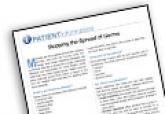Hospitals usually put patients who have had methicillin-resistant Staphylococcus aureus (MRSA) in isolation. However, researchers who conducted a 9-month pilot project at Christiana Care Health System in Newark, Delaware, say that many patients admitted with a history of MRSA colonization are isolated unnecessarily. They suggest that screening patients first is both cost-effective and better for the patients.
When surveyed, patients said the isolation made them feel stigmatized, contaminated, neglected, and distressed. One patient felt “treated like a plague victim.” The researchers also found that > 80% of the patients on the MRSA list were put at needless risk, especially when they roomed with another patient who had an active MRSA infection.
In the study, 7 medical-surgical units admitted 211 patients who were listed as MRSA positive (MRSA+) but who had not had a positive MRSA culture for ≥ 12 months. Of these patients, 23% did not complete the screening process, because they were discharged or were receiving antibiotics. Of the patients who did complete screening, only 32 (20%) were still colonized.
Thirteen of the 32 patients placed in contact isolation said the isolation had affected their hospital stay. Some felt they had fewer visitors because of the isolation; that the isolation measures were “off-putting” and “inconvenient” for visitors. They also felt they were treated differently by staff. Nine patients reported emotional distress, saying they felt uncomfortable and worried about their MRSA+ status.
The researchers used culture-based screening with CHROMagar MRSA plates rather than real-time polymerase chain reaction (PCR) screening. But cultures are less sensitive than is PCR screening, they say, and require a longer turnaround time, which can mean patients are not able to complete screening or may be erroneously removed from isolation. After the study was done, the researchers’ hospital switched to PCR assay screening.
Another potential area for improvement: Only 14 of the MRSA+ patients were aware that their previous MRSA diagnosis would remain on their patient record, and only 11 reported that they were given instructions for follow-up care after their discharge from the hospital where the diagnosis was first made.
The annual cost of screening for the 7 medical-surgical units was projected to be about $7,700. The cost associated with unnecessary isolation reached nearly $109,000 per year.
Source
Goldsack JC, DeRitter C, Power M, et al. Am J Infect Contr. 2014;42(10):1039-1043.
doi: 10.1016/j.ajic.2014.07.011.

